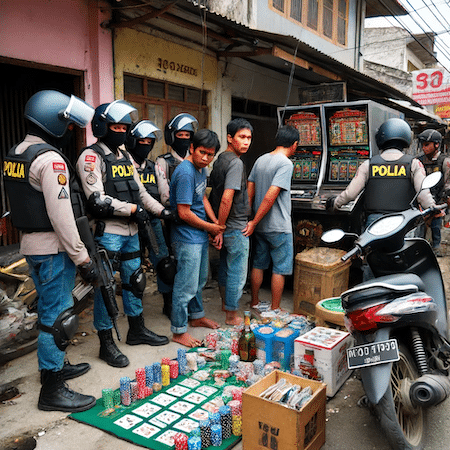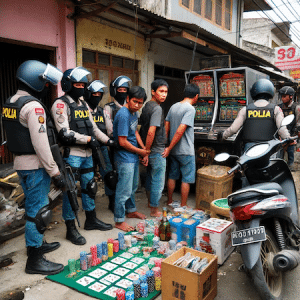Recently, Indonesia has seen a spike in gruesome murders allegedly linked to online gambling, prompting the country to ramp up its efforts to eradicate illegal gambling. The disturbing number of deaths underscores the significant challenges facing anti-gambling enforcement in the country.
President Widodo Calls for National Support Against Gambling
President Joko Widodo, who is set to hand over his responsibilities to president-elect Prabowo Subianto in the fall, has announced a crackdown on gambling activities, which have caused substantial economic losses and social harm. Widodo urged Indonesians to avoid both offline and online gambling, emphasizing the importance of saving money or investing it in business ventures. In a video posted to his social media, he called on public figures, religious leaders, and the general public to support the monitoring efforts and report any signs of online gambling.
It’s better if you have good fortune, you have money, you save it or use it as business capital. – President Joko Widodo
Indonesian National Armed Forces to Enforce Strict Measures
Commander of the Indonesian National Armed Forces, Agus Subiyanto, assured lawmakers that he would take strict action against any staff involved in online gambling. This announcement follows a series of deaths and suicides tied to online gambling. For instance, an East Java policewoman burned her husband alive, a fellow police officer, after discovering he spent their bonus salary on online gambling instead of on their twin babies’ supplies. Additionally, an officer in South Sulawesi embezzled 876 million rupiah ($53,000) from his unit to fund his gambling addiction.
Several other gambling addicts have reportedly committed suicide due to their debts. A navy member in Papua, who owed 819 million rupiah ($49,000) to the bank and friends, is one such case. Last December, a member of the national police counterterrorism squad received a life sentence for murdering a driver to steal his vehicle. He had previously spent his brother’s money on online gambling instead of buying a used car as requested. Another police officer in Bali allegedly pawned 11 rental cars last year to fund his gambling habit.
Legal Consequences and Government Actions
In Indonesia, gambling participants and organizers face up to 10 years in prison and a maximum fine of 25 million rupiah ($1,500). Distributors of online gaming software can be sentenced to six years in prison and fined 1 billion rupiah ($60,000).
In May, Indonesia established a multi-agency task force to collaborate with Interpol in tackling online gambling. Between July 17, 2023, and May 21, 2024, the communications ministry blocked over 1.9 million pieces of online content advertising gambling. Additionally, around 5,000 e-wallets and bank accounts suspected of being used by online gamblers were also blocked.
By taking these steps, Indonesia aims to curb the illegal gambling activities that have led to such tragic outcomes and ensure the safety and well-being of its citizens.
Gambling Laws in South East Asia
Gambling regulations in Southeast Asia vary significantly across different countries, reflecting diverse legal frameworks and cultural attitudes towards gambling. In Singapore, for instance, the government strictly regulates gambling through the Casino Regulatory Authority (CRA), which oversees the operations of the country’s two integrated resorts, Marina Bay Sands and Resorts World Sentosa. These casinos are allowed to operate under stringent conditions, including hefty entrance fees for locals to discourage frequent gambling. Additionally, online gambling is heavily restricted, with the Remote Gambling Act prohibiting all forms of online gambling unless exempted by the government. This act led to the blocking of hundreds of gambling websites and the prosecution of several illegal gambling operators.
In contrast, Cambodia has taken a more liberal approach towards gambling to attract foreign investment and boost tourism. The country permits casinos to operate, particularly in border towns and tourist areas, under the oversight of the Ministry of Economy and Finance. The city of Poipet, located near the Thai border, has become a hotspot for gambling due to the influx of Thai tourists seeking casino entertainment. However, locals are generally banned from participating in these activities. In recent years, Cambodia has also seen a rise in online and crypto gambling operations, although the government announced a crackdown on such activities in 2019, citing concerns over crime and social order. This move led to the suspension of all new online gambling licenses and the non-renewal of existing ones, significantly impacting the industry.
Related News
- Tabcorp Faces Hefty Fine for Allowing Underage Gambling
- Online Advertising’s Influence on Youth: A Closer Look at Gaming and Gambling
- Analysis of Gambling Addiction Across U.S. States – Here are the Findings
- Golf Event Raises Significant Funds for Problem Gambling Research


